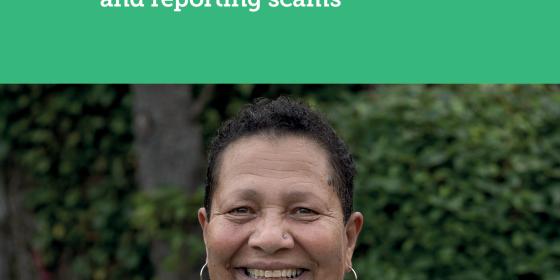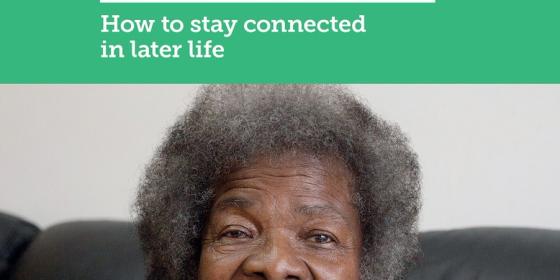
Fighting against scams
I started working for East Sussex Trading Standards as a consumer advisor. I took the job so I could save enough money to go travelling again. That was 16 years ago. Vegas is still waiting! I climbed the ranks in East Sussex Trading Standards and in 2012 I started what is now the National Trading Standards Scams Team (NTS Scams Team).
Fighting scams and trying to help the people that are affected by scams has become a personal battle of mine. I feel extremely passionate about the issue and want to get it to the top of as many people’s agendas as possible.
An underestimated problem
Historically, professionals were not aware of the scale of problem. The Office of Fair Trading carried out a study into mass marketing fraud in 2006 which detailed the estimated detriment at £3.5 Billion.
Here at the National Scams Team, we think it’s a much bigger problem, closer to £10 Billion lost every year by UK residents to fraud and scams. This only covers the direct financial loss, not the societal costs or other harms caused by people being defrauded that we can’t always measure such as anxiety, depression, family breakdowns, social isolation and in the most severe cases, people considering or taking their own lives.
Len’s story
The first victim I remember and the one who spurred us on to start the work we do is Len. This is Len's story:
In May 2009, Len's neighbour rang the advice line having seen a news report about the “Scamnesty” campaign. He was referred to East Sussex Trading Standards where I worked and a visit was arranged with a colleague of mine called Tom.
When Tom arrived it was uncovered that Len was receiving 600 scam letters a month, which amounted to 70 letters a day.
Len was 96 years old. He had been a gunner in North Africa campaign during the Second World War. He was a senior chartered surveyor and retired on a very good pension. He lived in a beautiful seafront flat overlooking Eastbourne pier. He had two children who he saw and spoke to regularly. He was no fool.
On one single day, 5th May 2009, Len received 53 letters. Combined together, the letters said the winnings that he had won were over £60 million pounds.The average winnings were in excess of one million pounds.
The total sums that he had been asked to send them in “processing fees” were £900, mainly in small sums of £20 each.
The criminals encourage the victim to be secretive about their “win”. Criminals know that sharing the information will increase the likelihood that the victim may respond more critically and objectively to the offer.
Len told us “I know I’ve been foolish”. But Len still preferred to believe that just one of the letters would be the “needle in the haystack”.
The losses can be many thousands of pounds over time. Len didn’t keep track, so his total losses are unclear but in one 10-day period he had spent £600
Len is the victim who will stay with me because we got to him too late and weren’t able to help him. We couldn't stop the criminals from grooming him, abusing him and then trafficking his personal details. Len's story is sadly not uncommon, there is a Len in every street and every village, so we decided we need to try and find them.
Identifying and supporting the victims of scams
Here at the NTS Scams Team, we work with over 40 national partners, including international law enforcement partners, to identify the ‘silent victims’ of fraud and scams. We do this by seeking out the lists that the criminals use to target people with fake lotteries, misleading prize draws and fake clairvoyant letters. They all have a similar style. ‘Just send £X to receive your winnings’, ‘You are the WINNER!’ ‘Send £X to claim your once in a lifetime prize’. There are no prizes and everyone is told they will win.
Once we have identified a victim we pass this information to one of the 200 local Trading Standards so they can visit, support and return any money to consumers.
We currently have over 300,000 potential victims on our databases.
Ending the stigma around scams
We are fighting to not only to change the perception of fraud and scams, because we still hear that people who fall victim to scams are silly or stupid.
These people are sadly not treated as victims of crime. Scam and fraud victims are targeted by organised crime groups and are defrauded out of what is often their life savings, leaving them without any money.. They are also left with the mental scars of being a victim of this crime.
However, they are still not treated the same as someone who is mugged in the street or as someone who is burgled. This needs to change, we need to take away the shame and the stigma to increase reporting and awareness.
Vulnerability is fluid and complex. In our opinion, people themselves are not vulnerable, its their circumstances that make them vulnerable. Therefore, as nothing stays the same, people move in and out of vulnerable situations and circumstances.
Scams cause real harm, beyond the financial loss
Within the NTS Scams Team, our average victim is 75. We do focus on scams that target older people, such as mail scams and doorstep crime. This is where we feel the most harm is caused. If someone is defrauded in their own home they are more likely to go into residential care within twelve months.
Retired people do not have the same opportunity to make up their losses as younger people, they often don’t have the same support networks and access to them.
Therefore the focus should always be on harm, not on age or money lost, but on the harm this crime has caused an individual. Our resources are aimed at education people, reducing harm and prevention of scams through our proactive identification of victims, targeted enforcement work and the Friends against Scams campaign.
We need to build community resilience and increase our knowledge and prevent this from happening to our mums, dads, and neighbours.
Looking out for each other
Prevention is far better than cure so we need to work together to educate people on how NOT to become a victim.
Let’s look out for our neighbours and our local people and check for the tell-tale signs of financial abuse and fraud. Are people receiving loads of letters each week? Do they use books of stamps? Are they struggling to pay for other things? Does the phone ring constantly? Let’s take away the shame and talk about it.
So now I am inviting you to get on the scam wagon and help us highlight this problem! Get involved. Please join us in our Stand Against Scams and become a Friend Against Scams at www.friendsagainstscams.org.uk.
Louise Baxter is a Team Manager at the National Trading Standards Scams Team.
Have you been affected by any of these issues? If you have been affected by any of the issues described in this blog, or simply need someone to reach out to, you can call Independent Age’s freephone Helpline for information and advice on 0800 319 6789. The views and opinions expressed in this article are those of the author and do not necessarily reflect the policy or position of Independent Age. |

